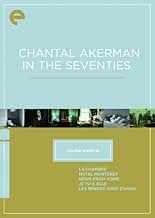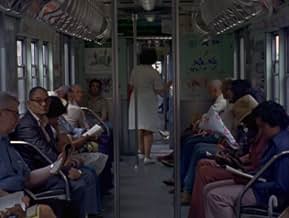Füge eine Handlung in deiner Sprache hinzuImpersonal and beautiful images of Akerman's life in New York are combined with letters from her loving but manipulative mother, read by Akerman herself.Impersonal and beautiful images of Akerman's life in New York are combined with letters from her loving but manipulative mother, read by Akerman herself.Impersonal and beautiful images of Akerman's life in New York are combined with letters from her loving but manipulative mother, read by Akerman herself.
- Regie
- Drehbuch
- Hauptbesetzung
- Self - Letter Reader
- (Synchronisation)
Empfohlene Bewertungen
Then there's the other core element of 'News from home,' the voiceovers of filmmaker Chantal Akerman. As she reads letters that she had received from her mother we also get a small taste of life in Belgium at the time, and especially of the friends, family, and neighbors that Akerman herself had known. More than that - as the letters date to the period when Akerman had lived in New York, often traversing these very streets and subway lines, we are party in some measure to the relationship between her and her mother. The title becomes not just a moment captured in time of the city, but a reflection on a parent's love for their child, of wistfully missing someone who is far away, and in the very least of thinking of Home when we've gone far afield. (Or perhaps, too, a peek at the unspoken disparity between the perspectives of parent and child.) Thus is an air of fond remembrance infused into the presentation, a gentle warmth that couples neatly with the nostalgia of writing letters and the audiovisual visitations to this one time and place. The result is plainly lovely, bewitching, and even heartwarming to some degree. Why, there's almost a sense of whimsy to it all; one can readily imagine a work of fantasy or science fiction that adopts the same tack, showing us a distant world or landscape while letters from home provide a kernel of living, breathing story, whether it's a fragment of narrative or, as in this case, soft emotional context. That such feelings can be evoked by these eighty-eight minutes speaks very well to the power of cinema generally and, here, to the underappreciated genius of Akerman as a filmmaker.
I'll be honest: I love this. Plainspoken as any one-line synopsis is I didn't truly know what to anticipate, but in no time at all after I sat to watch I came to adore it. Many are the movies that have been made about someone moving to The Big City, and missing home, and all the goings-on or misadventures they might get up to in that scenario, but such fare is always embellished for effect, whether comedic or dramatic. Inasmuch as there could be a comparison to such fictional works 'News from home' is much the same concept, except it's perfectly Real and Authentic, and stirs the viewer's thoughts and feelings with that genuineness alone. Outwardly unsophisticated as the craft may be, the skill, intelligence, and care that went into it is indisputable, and the end product speaks for itself. This film is a pleasure. I vaguely assumed I'd appreciate it just for Akerman's involvement alone, and still I'm so very happy with how excellent it really is. By all means I can understand how this won't appeal to all, though as far as that goes the premise should be all the fair warning needed to turn away those who aren't receptive. Yet for viewers who enjoy the quiet, thoughtful side of the medium, or those who find joy in the mundane, I can't overstate what a great treasure this is. 'News from home' is a sublime picture that strikes a rather unique but meaningful chord, and I'm glad to give it my very high, hearty recommendation.
Chantal's camera records all this squalor in exquisite, non-judgmental long takes. You can almost smell the place. Somehow, the city arranges itself for her in fascinating compositions of color, personalities, and activities. What's that guy over there doing? What is that woman thinking about?
In counterpoint to the visuals, Chantal reads irritating letters from her beloved mother complaining that Chantel does not write frequently enough and When is she coming home? But how could she come home when there is such rich, baroque subject matter for her camera? We know that after her mother died several years later, Chantal committed suicide. The tension between her mother's letters and the power of the city is palpable.
Chantal has left us this gift of a precise record of a time and place that existed once and will not exist again. The final extremely long shot, taken evidently from the Staten Island ferry, is of Manhattan with its Twin Towers still present slowly receding and disappearing in the mist.
It's a far piece from the world of Kenyon & Mitchell, but Akerman is not filming events where the attendees might hope to see themselves in a theater. I watched this movie and tried to figure out where each shot was taken. I think I was pretty successful. That game, however, did not take up the whole of the 85 minutes of the movie, and what was someone who was not an adult in Manhattan in the 1970s supposed to do? After ten or fifteen minutes, I decided that the audience was supposed to make of this a portrait of the recipient of the letter, an individual whose mother thinks she is hungry for news of the family, who never writes about whether she is happy or has made any friends (inference: she isn't and hasn't), and the shots are of her world in New York: first downtown near the River, then a long sojourn in the Times Square Subway Station and finally a ten-minute shot from the stern of the Staten Island Ferry setting out of Manhattan.
I think that with this movie, Akerman is trying to rewrite the relationship between film maker and audience. A film maker makes a film that tells a story, and the audience is the perceptive receiver of that tale, whether it is fiction or fact. We infer plot from the course of actions, from the changes in the personality, status, and relationships of the characters. We derive character from the way in which individual performers differ from the stereotyped roles. What, however, are we to make when you don't see the performer, don't hear her voice, except as a hurried reader of letters?
Well, the stereotypical responses fall neatly into two types. The first type says "Dagnabit! I came here to see a movie with interesting characters and a story! This is awful!" The second says "Ahah, this is new and interesting technique. I get what the auteur is trying to do, and approve, because that makes me a smarter, more percipient viewer." Which are you?
As for me, my reaction is "Interesting technique, but I'd prefer a little more effort from the film maker than forcing me to either fall asleep or make up my own story out of rags and tags." That's because I don't insist on a purely conventional story, but rather than being such an intelligent viewer that I get exactly what Akerman is trying to do, I'd like to have some character.
Wusstest du schon
- WissenswertesWhen Akerman's mother writes her father lost 300,000 francs due to a client's bankruptcy, that would equate to about $8,300 at the time or $38,100 in 2019.
- Zitate
Herself - Letter Reader: I received your screenplay. It's well-written, but you know my taste: I find it sad and gloomy. Those people sure have a hard life. It's an important social issue. I hope it will turn out well. The public must be made aware of all this suffering that you young people see so clearly.
- VerbindungenFeatured in What to Watch: Cate Blanchett's Films of Hope (2020)
Top-Auswahl
- How long is News from Home?Powered by Alexa
Details
- Erscheinungsdatum
- Herkunftsländer
- Sprache
- Auch bekannt als
- News from Home
- Drehorte
- Veselka Restaurant, 144 2nd Ave, New York City, New York, USA(newstand outside with awning in Ukrainian)
- Produktionsfirmen
- Weitere beteiligte Unternehmen bei IMDbPro anzeigen
- Laufzeit
- 1 Std. 29 Min.(89 min)
- Sound-Mix
- Seitenverhältnis
- 1.37 : 1






















